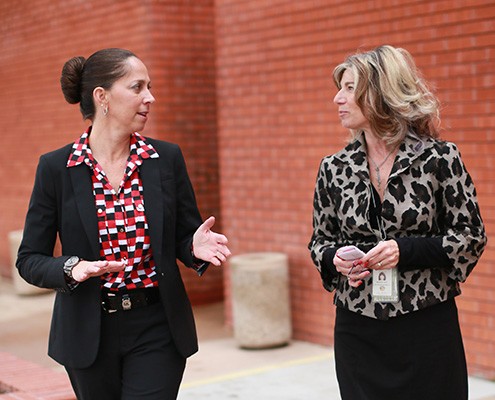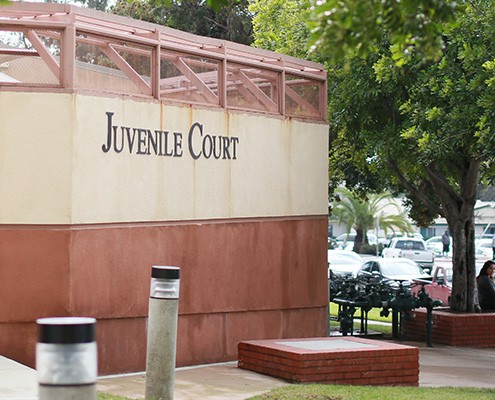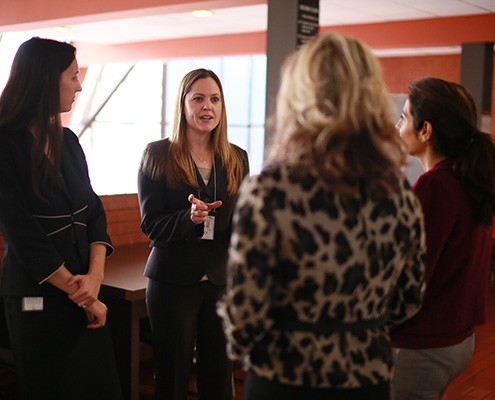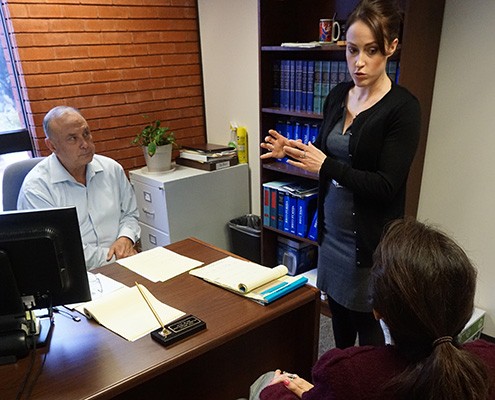| 2015 Staffing | |
|---|---|
| Attorneys | 20 |
| Investigators | 2 |
| Process Servers | 0 |
| Paralegals | 6 |
| Support Staff | 16 |
| Student Workers | 1 |
| Victim Witness Advocates | 2 |
| 120 Day Attorneys | 4 |
| Total | 51 |
Criminal Cases Submitted For Review
Felony Petitions Filed
Misdemeanor Petitions Filed
WI 707 File Petitions
Direct Filed Cases
Truancy Petitions Filed
The Juvenile Division office is broken down into teams: Issuing, Calendar, Motions, Trial, Truancy, Drug Court, and Sexual Assault-Domestic Violence.
Issuing
Deputies review reports submitted by police agencies to determine whether a crime has occurred. The deputies decide which charges should be filed against the minor and include those charges on the charging document which is called a petition. At the time of issuing, a Deputy DA will review each minor’s prior criminal history and statistical information to determine the minor’s eligibility for deferred entry of judgment and/or informal supervision by Probation.
Calendar
There are four delinquency departments in San Diego Juvenile Court. Each court is assigned a Deputy District Attorney who appears on the cases in court on behalf of the People of the State of California. The calendar Deputy District Attorney reviews police reports, probation reports and other documents when making arguments to the court on how a minor’s case should be resolved.
 Motions
Motions
The team consists of a team leader, an assigned Deputy DA and legal interns. Sometimes the team gets help from a graduate law clerk. The motions team handles arrest warrants and the majority of pre-trial motions filed with the Court. The bulk of the motions are being filed under the California Welfare and Institutions Code Section 654 (informal supervision). However, there is a wide variety of other motions filed, including evidence suppression, requests for probation modification, plea withdrawal, speedy trial, and sealing. The Motions team also assists the division with appellate issues and motions for modifications on Prop 47 cases which allowed for the reclassifications of numerous felony crimes to misdemeanors and the recalculations of the imposed penalties.
Trial
This team handles all disputed matters, including but not limited to trials, evidentiary hearings, restitution hearings, contested dispositions and prima facie hearings. Trial team deputies review police reports, determine which witnesses should be subpoenaed, prepare the case for hearing, conduct the hearing and appear at the disposition hearing (sentencing) in cases where the minor is found to have committed a crime.
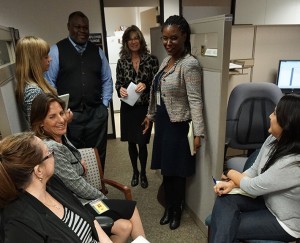 Sexual Assault / Domestic Violence
Sexual Assault / Domestic Violence
This team handles cases related to sexual assault, pornography, sex trafficking, child exploitation, sexting, child abuse and domestic violence among teens. Two Deputy DAs from this team handle all these cases and hearings as opposed to different deputies from different teams handling the case. The team issues cases after review of police reports and victim interviews, they handle detention hearings, readiness hearings, settlement conferences, trials, probation violations, motions to seal records and disposition (sentencing) hearings. The team works closely with the victim/witness advocate assigned to the Juvenile Division and law enforcement agencies throughout the county on juvenile law as it relates to this type of case. The team also collaborates with Probation’s Juvenile Sex Offender Management Unit, Child Welfare Services, and certain victim services organizations on these sensitive cases. Team Leader, Deputy DA Fanny Yu, is a member of the San Diego Regional Human Trafficking and CSEC Advisory Council and San Diego Police Foundation’s SafetyNet Advisory Council.
There are four specialized calendars in Juvenile Court; Dual Calendar, J-Fast, Truancy and Drug Court.
Dual Calendar
This calendar consists of minors who have an active dependency case and a new delinquency case. In some situations, a minor can be supervised by both Probation and Health and Human Services Agency with one court addressing their needs from both jurisdictions at the same time.
J-Fast
In addition to being a juvenile team, this is also behavioral health court, which handles cases where a minor has a delinquency case and mental health issues are hindering them from being successful on probation. In addition to the assistance received by a minor through the traditional justice partners (the judge, defense attorney, Probation Officer and District Attorney), minors and their families are also provided support in the form of wrap and mental health services. Wrap services include a parent partner and youth partner to help both the family and minor address issues within the family and obtain needed services in the community.
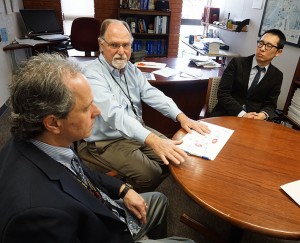 Truancy
Truancy
Cases are handled by the truancy team during a specialized calendar once a week at the juvenile courthouse and once a month at the Vista courthouse. Truancy partners include the San Diego County Office of Education, all 42 school districts in San Diego County, Probation, Public Defender, law enforcement agencies, drug treatment facilities, Vista Hill, Community Based Organizations (MHS, Lifeline, SDYS, SAYSD), VIP mentors, a judge, and the Children’s Initiative. The truancy team leader works closely with school districts by attending attendance review hearings, providing mediation services for elementary school districts, and assisting the schools and families in working out programming and support to keep students from being referred to truancy court. Mediation services have expanded greatly during 2015 with the truancy team leader meeting with school representatives, truant children at the elementary grade level and the truant’s parents to help resolve issues that have become barriers to school attendance.
Drug Court
This court provides comprehensive drug and mental health treatment within a probationary setting. The Drug Court calendar is held twice a week at the Juvenile Court and one day a week at the Vista Courthouse. The Drug Court team consists of judges, a Public Defender, a District Attorney, Probation Officers, two therapists from SAY San Diego and substance abuse professionals. The goal is to identify minors whose criminal conduct is primarily motivated by drug or alcohol abuse issues and who have failed to respond to traditional probation intervention. Once identified, we rehabilitate them with an emphasis on intensive substance abuse therapy.
Additionally, to ensure that crimes with the highest potential to significantly affect the public are handled in an efficient manner, certain cases are assigned to one prosecutor for the length of the case. This means one Deputy District Attorney handles the case from beginning to end.
These types of cases include:
- Arson
- Drug Court
- Mental Competency
- Graffiti
- Teen Prostitution, Teen Relationship Violence (TRV) and Sexual Assault
- Truancy
- Vehicular Manslaughter
The Juvenile Division handled a wide variety of crimes last year including simple misdemeanors, robbery, drug smuggling, sexual assaults and arson. During the same time, a juvenile was charged with arson for intentionally setting fire to brush burning 2,000 acres of wild lands and prompting the evacuation of a large area of the City of San Marcos. The evacuation affected over 176,000 San Diego County residences causing over $10.4 million dollars in damages, destroyed 38 homes and cost the county over $28 million to extinguish the fire. The minor was true found – similar to guilty in an adult case – and held accountable for her actions. She received services from the Burn Institute to understand the effects of her actions.
The Juvenile Division continues to work closely with juvenile justice partners throughout the county to ensure the highest level of services are available to the youth in order to provide appropriate rehabilitative services and reduce recidivism. The juvenile justice system, which is driven by the Probation Department and the courts, has focused on evidence-based practice and trauma informed care. In order to incorporate these theories into juvenile justice, the Juvenile Chief and Assistant Chief are involved in numerous probation and community programs. These include Crossover Youth Project, Positive Youth Justice Initiative, Alternatives to Detention, Graffiti Arts Mural Project, Probation Tattoo Removal Program, and Mid-City Restorative Justice Mediation Project. Chief Michelle Linley is also a member of the Juvenile Justice Coordinating Counsel and gives regular updates to the Juvenile Justice Commission. Assistant Chief Lisa Weinreb sits on the Board of Mental Health America and the International Bipolar Foundation.

